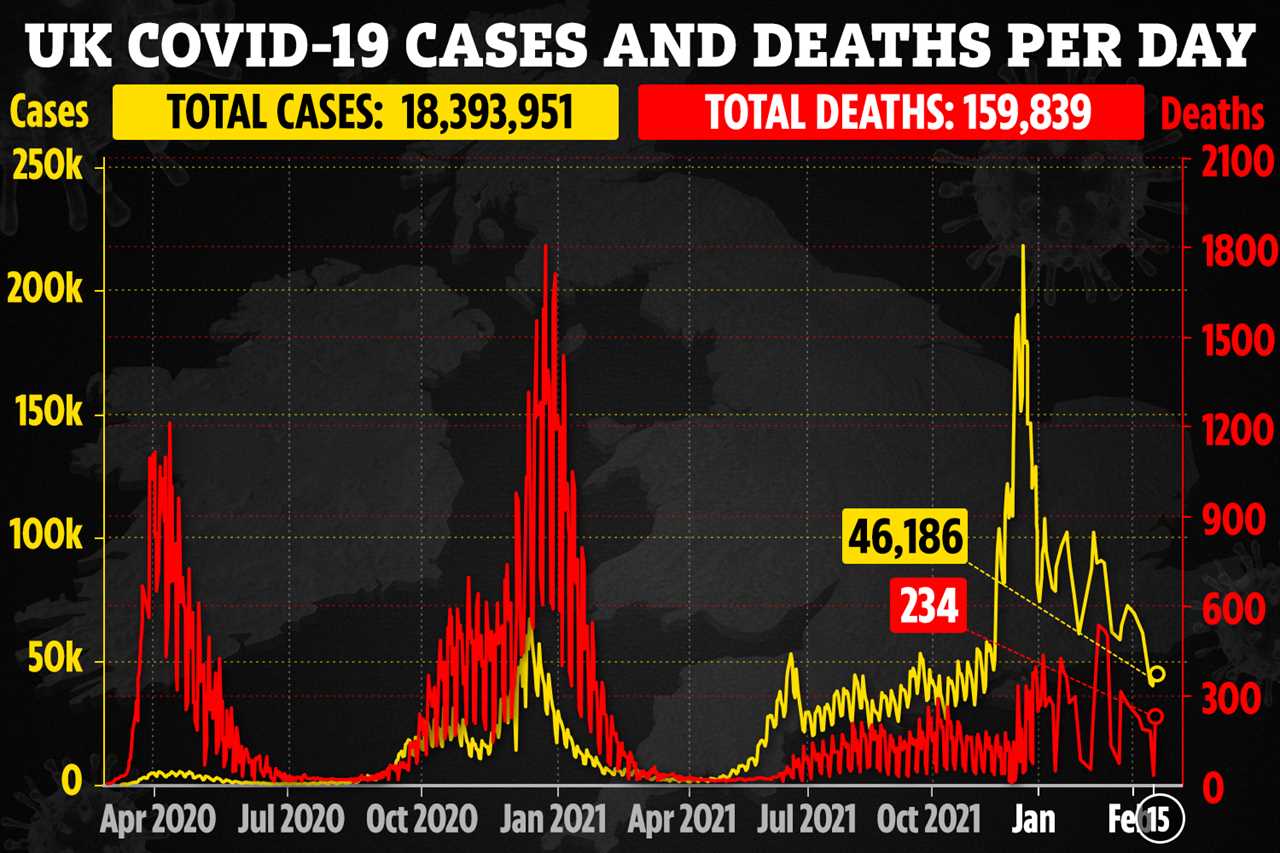DAILY coronavirus infections in the UK have fallen by 30 per cent in the last week, with a further 46,186 people testing positive today.
Cases are also down by 43 per cent on last month, with over 80,000 Brits testing positive on January 15.

Sadly, a further 234 deaths within 28 days of a positive test have been recorded today.
That’s up on yesterday’s figure of 35, but down by 18 per cent on the total this time last month.
The new data today comes as experts have revealed that fully jabbed people are less likely to suffer with long Covid.
Omicron is a milder illness and most people who catch it have experienced cold-like symptoms.
But it’s not milder for everyone and those who are vulnerable and elderly are most at risk of severe illness.
That’s why it’s important that everyone gets their vaccines in order to protect themselves and others from the strain.
As Omicron was most prevalent in December in the UK, it’s not yet clear as to what impact the variant would have in terms of long-term health issues.
But a new paper showed that compared to the unvaccinated, those who had at least two jabs slash their risk of the crippling condition by 50 per cent.
The new research from the UK Health Security Agency looked into 15 British and international studies.
Around two per cent of the UK population have reported symptoms of the condition, which includes fatigue, shortness of breath and pain.
The study found people with Covid who had two doses of Pfizer, AstraZeneca, or Moderna – or one dose of the Janssen vaccine – were about half as likely as people who had one dose or less to develop long Covid symptoms over 28 days.
‘GET YOUR JABS’
Dr Mary Ramsay, Head of Immunisation at the UKHSA, said: “These studies add to the potential benefits of receiving a full course of the Covid-19 vaccination.
“Vaccination is the best way to protect yourself from serious symptoms when you get infected and may also help to reduce the longer-term impact.
“For most people symptoms of long Covid are short-lived and resolve overtime.”
“But for some, symptoms can be more severe and disrupting to their daily lives.
“If you’re experiencing unusual symptoms particularly for longer than four weeks after infection, you should consider contacting your GP.”
The condition has been dubbed as “long-Covid”, most commonly causing chronic fatigue and physical pain.
RISK FACTORS
NHS medical director Professor Stephen Powis said: “With more than 10,000 people in hospital with Covid – this study is a timely and important reminder that vaccines remain our best protection against the virus, reducing the chances of becoming seriously unwell as well as the effects of long Covid.
“The NHS vaccination programme has helped prevent over 100,000 hospitalisations since mid-December alone, and so the NHS is clear, when eligible book in for your vaccine without delay.”
Millions of adults in the UK are thought to have had, and still have, the condition.
The chances of having long-term symptoms do not seem to be linked to how ill you are when you first had the coronavirus.
Although this latest data shows vaccinations give you a better chance of not developing the condition.
But there does seem to be some risk factors – including being a woman, aged 35 to 69, having obesity or an underlying health condition, living in a poor area or working in healthcare.
TEST AXE
It comes as free PCR tests will be axed within days as part of Boris Johnson’s plan to live with Covid.
The PM is drawing up proposals to charge people if they want PCRs.
It is understood they will remain free for vulnerable people and within hospitals and high-risk settings.
Brits are currently told to get a highly-accurate PCR test after coming into contact with someone with Covid, but this advice is also set for the chop as the nation gets back to normal.
PCR tests which were previously needed for travel could cost more than £100 privately.






